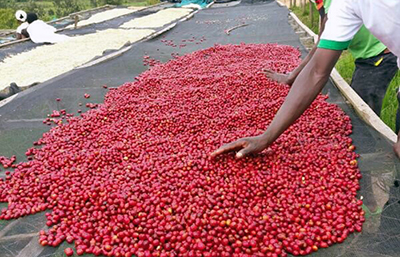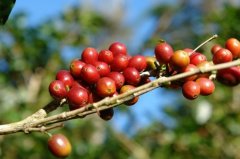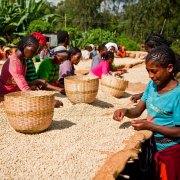A brief History of Kenyan Coffee: how Kenyan Coffee Origin appreciates Kenyan Coffee Flavor

Open classification: coffee mixed beverage life western beverage
Kenyan coffee, the taste is very unique, almost no similar coffee. Kenyan coffee is characterized by a distinctive fruity aroma.
Abstract
Basic information module
English name: Kenya Coffee: Kenya Coffee
Features: the taste is very unique location: Kenya
Catalogue
1 introduction
2 Origin
3 brief history
4 appreciation
5 flavor
Profile / Kenyan Coffee
Kenyan coffee tastes so unique that there is almost no similar coffee. Kenyan coffee is characterized by a distinctive fruity aroma. Try to find this flavor in the coffee and pay attention to how it feels in the mouth. One of the common fruit aromas is citrus. Kenyan coffee has a multi-layered taste and the acidity of fruit juice, perfect grapefruit and wine flavor, medium mellow. Kenya is located on the equator on the Indian Ocean coast of east-central Africa, to the south of Ethiopia. [1]
Origin / Kenyan coffee
It entered Kenya in the 19th century, when Ethiopian coffee drinks were imported into Kenya through southern Yemen. But it was not until the beginning of the 20th century that the bourbon coffee tree was saint. The Austin Mission (St.AustinMission) was introduced. Kenyan coffee is mostly grown at an altitude of 1500m, 2100m, and is harvested twice a year. To ensure that only ripe berries are picked, people must tour the forest about seven times. Kenyan coffee is grown by small farmers. After they harvest the coffee, they first send the fresh coffee beans to the cooperative cleaning station. The washing station sends the dried coffee to the cooperative in the form of "parchment coffee beans" (that is, coffee beans covered with endocarp) to the cooperative ("parchment coffee beans" is the last state of coffee beans before peeling). All the coffee is collected together, and the growers charge the average price according to their actual quality. This trading method generally works well and is fair to both growers and consumers.
A brief history / Kenyan coffee
Kenya is bordered to the north by Ethiopia, the origin of Arabica coffee trees, but it was not until the beginning of the 20th century that coffee cultivation began. In the 19th century, missionaries introduced Arabica trees from Yemen, but did not plant them in large quantities. It was not until 1893 that coffee was cultivated on a large scale by the introduction of Brazil's ancient "bourbon" coffee seeds. In other words, the current Kenyan coffee is of Brazilian origin, and the taste of Kenyan beans is very different from that of Brazilian beans due to differences in water, climate and handling.
Brazilian coffee is planted at a low altitude, with soft texture and no obvious sour taste. In contrast, Kenyan coffee trees are mainly concentrated on the slopes near Mount Kenya, about 4 to 6500 feet above sea level, which is suitable for coffee beans to develop their flavor, because the mountain temperature is lower and the growth is slower, and the aromatic components of coffee beans are fully developed. the acidity of the fruit is more obvious and the texture is harder. In addition, Kenya was an early British colony, and the British had established a perfect cultivation and quality control system. After the independence of Kenya, the coffee industry has made great strides on the existing basis and has become a foreign exchange earning industry in Kenya.
Connoisseur / Kenyan coffee
If you only know how to brew, but not how to taste coffee, the original delicacy may become tasteless. Some people taste coffee with the taste of the tongue, while others enjoy the aromatic mellow in the mouth. in addition, it depends on the condition of the body and the atmosphere around the coffee. In a word, tasting coffee is a very delicate thing. When you drink coffee in a coffee shop, you sometimes drink almost half-cold coffee. No matter how good the coffee beans are and how good the brewing skills are, you will lose your appetite for coffee. Drinking while it is hot is a necessary condition for tasting delicious coffee, even on a hot summer day. When the coffee is cold, the flavor will decrease, so when brewing the coffee, in order not to reduce the taste of the coffee, soak the coffee cup in boiling water in advance. The appropriate temperature for coffee is 83 degrees Celsius at the moment of brewing, 80 degrees Celsius when pouring into the cup, and 61-62 degrees into the mouth, which is the most ideal.
Taste delicious coffee, in addition to pay attention to the appropriate temperature, but also have the right amount. Drinking coffee is not like drinking or juice, a full cup of coffee, watching it will lose interest in drinking. Generally speaking, it is only seven or eight minutes full for the right amount, moderate amount of coffee will not only stimulate the taste, after drinking it will not have a "greasy" feeling, but endless aftertaste. At the same time, the right amount of coffee can moderately promote the body to recover from fatigue and refresh the mind.
There are different flavors of coffee, so you can't drink three or four cups in a row like tea or cola, but the size of a formal coffee cup is just right. Ordinary coffee to 80-100cc for the right amount, sometimes if you want to drink three or four cups in a row, then it is necessary to dilute the concentration of coffee, or add a lot of milk, but still take into account the degree of physical needs, to add or reduce the concentration of coffee, that is, do not cause greasy or nauseous feeling, and in the allocation of sugar might as well be more changes to make the coffee more delicious.
Flavor / Kenyan coffee
Aromatic, full-bodied, with fruit flavor, taste rich and perfect. Kenyan coffee has a wonderful fruit flavor, tastes like BlackBerry and grapefruit, and is a favorite of many coffee gluttons. This coffee has an excellent medium purity, crisp and refreshing taste. It has a fresh flavor and is most suitable for drinking iced coffee in summer. When tasting this coffee, if it is paired with sour fruits such as grapefruit, it will certainly give me the best coffee experience. "not much like coffee, but a bit like fruit tea" is the common feeling of many people about this kind of shallow roasted Kenyan coffee. In addition to having obvious and charming fruit acidity, Kenyan coffee is mostly from small coffee farmers, planted in a variety of different environments, encounter different climate and rainfall every year, and bring a variety of distinct and unique personalities. Take the AAPlus grade "KenyaAA+Samburu" as an example, the Samburu in 2001 has a strong aroma of black plum, the acidity is not high, and the taste is strong. The newly harvested Samburu in the winter of 2002 presents a completely different flavor, mulberry and green plum, with a little Nanyang spice (Spicy) flavor, after drinking, the aftertaste has the sweetness of green tea, the acidity is slightly higher than the year before, the taste is still strong. The common Kenyan taste is not strong, but it has a bright fruit-like flavor, some spicy and some red wine. This is how Kenya makes coffee fans full of expectations and surprises!
Important Notice :
前街咖啡 FrontStreet Coffee has moved to new addredd:
FrontStreet Coffee Address: 315,Donghua East Road,GuangZhou
Tel:020 38364473
- Prev

What are the characteristics of Kenyan coffee beans Kenya AA coffee defect rate Kenyan coffee bean roasting
Professional coffee knowledge exchange more coffee bean information please follow the coffee workshop (Wechat official account cafe_style) love individual coffee big, for coffee producing countries like Kenya, are full of confidence, not only Kenya coffee flavor is rich: strong aroma, obvious acidity, especially Kenya coffee after the harvest, must be set up by the government in Kenya
- Next

Kenyan coffee grading system Kenyan specialty SL28&34 coffee varieties Kenyan coffee origin
Professional coffee knowledge exchange more coffee bean information please follow the coffee workshop (Wechat official account cafe_style) Kenya Coffee KENYA is located in East Africa Kenya is one of the major coffee producing countries, the country's population of more than 6 million people are engaged in the coffee industry, mostly in the form of small farmers, wet processing plants and cooperatives. Kenyan coffee is mainly treated with water washing, coffee trees
Related
- Detailed explanation of Jadeite planting Land in Panamanian Jadeite Manor introduction to the grading system of Jadeite competitive bidding, Red bid, Green bid and Rose Summer
- Story of Coffee planting in Brenka region of Costa Rica Stonehenge Manor anaerobic heavy honey treatment of flavor mouth
- What's on the barrel of Blue Mountain Coffee beans?
- Can American coffee also pull flowers? How to use hot American style to pull out a good-looking pattern?
- Can you make a cold extract with coffee beans? What is the right proportion for cold-extracted coffee formula?
- Indonesian PWN Gold Mandrine Coffee Origin Features Flavor How to Chong? Mandolin coffee is American.
- A brief introduction to the flavor characteristics of Brazilian yellow bourbon coffee beans
- What is the effect of different water quality on the flavor of cold-extracted coffee? What kind of water is best for brewing coffee?
- Why do you think of Rose Summer whenever you mention Panamanian coffee?
- Introduction to the characteristics of authentic blue mountain coffee bean producing areas? What is the CIB Coffee Authority in Jamaica?

